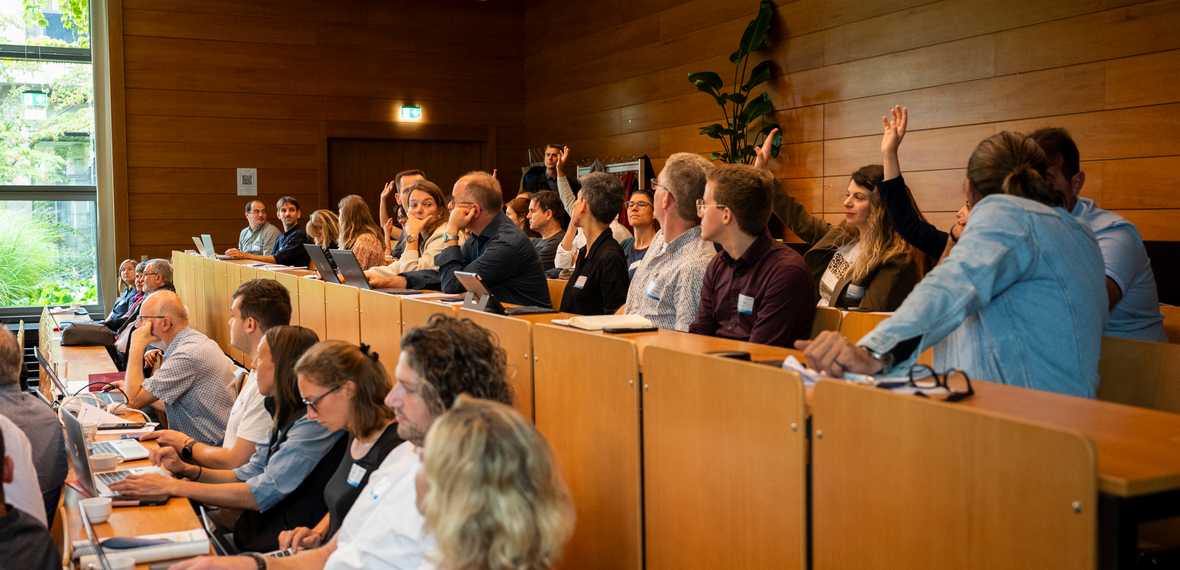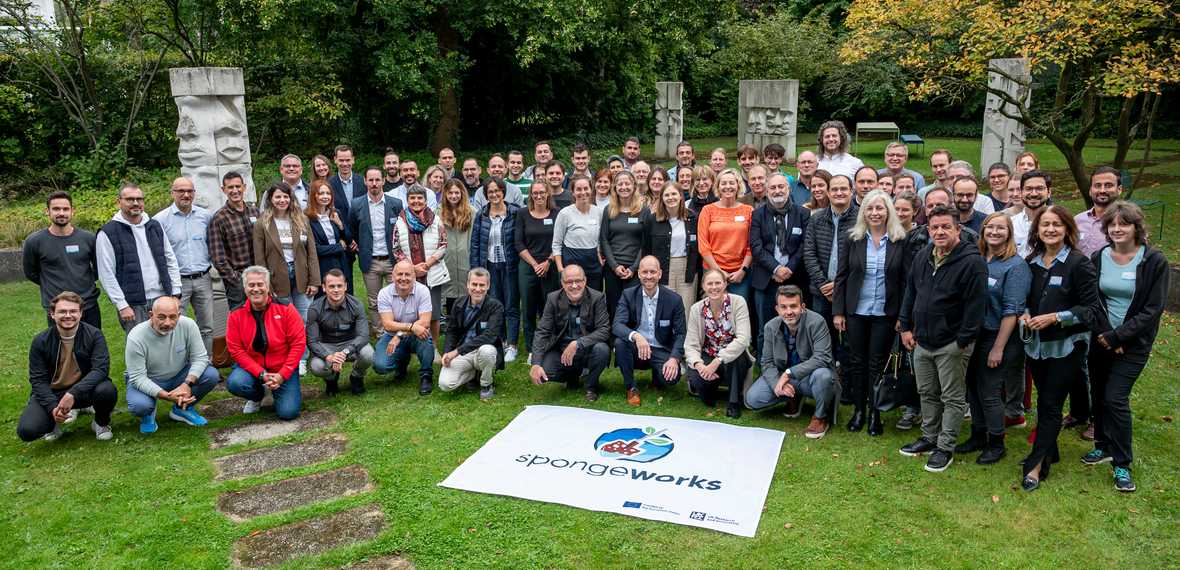As Europe warms at twice the global rate, the continent faces increasingly severe extreme weather events. Since 1980, over 1,500 European floods have caused more than 4,300 deaths and €170 billion in economic damages. The future impact of floods and droughts hinges on the health of European landscapes and their natural capacity to retain water, much like a ‘sponge’. Nature-based solutions (NbS) which improve the ‘sponge’ functioning of landscapes are emerging as a sustainable approach to enhance resilience, but major barriers still delay their widespread adoption.
In response, a new €15-million project, “Spongeworks: Co-creating and upscaling Sponge Landscapes by Working with Natural Water Retention and Sustainable Management" (2024-2028), funded by the EU’s Horizon Europe Programme, was launched in September 2024. Christian Albert from Leibniz University Hannover, the project coordinator, states, 'SpongeWorks will catalyse large-scale transformative change to enhance the resilience of interconnected groundwater, soil and surface water systems at landscape scale.”

SpongeWorks will be implemented by 28 Consortium Partners, in collaboration with, at least, 23 Knowledge Partners in three demonstrator sites across Europe.
SpongeWorks, which is coordinated by Leibniz University Hannover, Germany, and Deltares, Netherlands, will advance scientific knowledge and practical implementation in three large-scale river-basin demonstrators: Lèze in France, Pinios in Greece and Vecht, a transboundary basin shared between Netherlands and Germany. ‘Sponge measures’ implemented will range from different types of agricultural and broader management practices, creating hedges, buffer strips, and infiltration ponds, to restoring rivers and peatlands and rewetting forests and grasslands.
Watch the video:
During the project’s kick-off-meeting in Hannover Germany from 24-26 September Ellis Penning from Deltares, the co-coordinator, stated that 'through demonstrating the effectiveness of these measures within a wider landscape context in the three SpongeWorks demonstrators, we aim to inspire and enable other European regions to also implement nature-based measures to enhance climate resilience'.
SpongeWorks will address key questions regarding the upscaling of Nature-based Solutions and natural water retention measures across Europe, including:
- Which measures are most effective in terms of increased resilience, cost/benefit ratio and ease of implementation?
- What are the prerequisites for ensuring economic viability and mobilizing adequate financing?
- How can action plans and roadmaps be collaboratively developed for implementing sponge strategies at landscape scale?
- Which political and social engagement processes help ensure stakeholders effectively co-create and co-own these solutions?
- How can widespread replication be successfully achieved in diverse European regions?

From 2024 to 2028, SpongeWorks will address key questions regarding the upscaling of Nature-based Solutions and natural water retention measures across Europe.
On-the-Ground Implementation Across Three Demonstrators: 19 measures, over 800 individual farms and a network of 300+ stakeholders
SpongeWorks will implement 19 distinct sponge measures, covering 4,000 hectares of land, 47 kilometers of river, and 22 kilometers of hedgerows, involving over 800 individual farm plots. Project partners will collaborate closely with local decision-makers, experts and practitioners to jointly assess technical, socioeconomic, financial, and governance aspects. Through harmonized and systematic monitoring of soil, water quantity and quality, biodiversity, and socio-economic impacts, SpongeWorks will provide robust evidence on the effectiveness, co-benefits, and trade-offs, and socio-economic sustainability of these measures. The project will also actively support the replication of sponge strategies in a further 8 associated regions in Europe.
The SpongeWorks consortium is uniquely positioned to deliver this ambitious project, thanks to its 28 Consortium Partners and the backing of at least 23 Knowledge Partners. The Consortium includes on-the-ground implementation partners with hands-on experience, key local stakeholders like agricultural and environmental bodies, and leading European research institutions and universities across relevant fields. Activities in each demonstration basin are implemented by practice partners from authorities, land and water management groups, agricultural organisations, foundations, networks, SMEs and NGOs.
GWP-Med's role involves coordinating activities to ensure that the project's outcomes are effectively communicated and disseminated to relevant stakeholders. Capitalising on the successful communication of the Horizon2020 Rexus project, its role includes collecting and sharing data, results, and tools to build a strong case demonstrating that sponge measures are feasible, effective, and acceptable solutions for addressing shared challenges related to soil, climate, and water resources.
The activities will unfold at various levels:
- Demonstrator Level: Promoting awareness, engagement, and ownership of the sponge measures in the three project sites (France, Greece, and the transboundary basin between the Netherlands and Germany).
- Regional, National, and EU-wide Levels: Encouraging the adoption of a solutions framework that can be integrated with national strategies and EU Mission activities, leveraging networks and Communities of Practices to expand reach and impact.
By coordinating these efforts, GWP-Med will help promote the wider adoption of sponge measures and foster collaboration across multiple scales to address environmental challenges effectively.
The project will run from September 2024 to August 2028.
visit www.spongeworks.eu
(c) Sofie Puttfarken
SpongeWorks Consortium partners:
Coordinator:
Gottfried Wilhelm Leibniz Universitaet Hannover (University, Germany)
Co-coordinator:
Deltares (Research Institute, Netherlands)
Partners:
Office International de l'Eau (OIEau) (France)
International Network of Basin Organisatons (INBO) (France)
Ellinikos Georgikos Organismos Dimitra, Soil & Water Research Institute (Agricultural Research Organization, Greece)
IIASA (Research Centre, Austria)
GWP-Med (International Network of Water-related Organisations, Greece)
Universiteit Twente (University, Netherlands)
Technische Universitaet Dresden (University, Germany)
UK Centre for Ecology & Hydrology (Research Centre, UK)
Ecologic Institut gemeinnützige GmbH (Research Centre, Germany)
WWF Greece (Environmental NGO, Greece)
Agrotikos Synetairismos Paragogis Emporias Metapoiisis Frouton Kai Kastanon
Melivias Athanati (Agricultural Cooperative, Greece)
Dimos Agias (Municipality, Greece)
Anaptyxiaki Etaireia Dimou Trikkaion Anaptyxiaki Anonymi Etaireia Ota (Municipality, Greece)
Paseco Sp Ltd (Environmental consultants, Greece)
Topikos Organismos Eggeion Veltioseon Tavropou Karditsas (Irrigation Association - Greece)
Adict Solutions (Consultancy, France)
Chambre Agriculture Ariège (Agricultural Chamber, France)
Chambre d'agriculture de Haute-Garonne (Agricultural Chamber, France)
Centre National De La Recherche Scientifique (Research Centre - France)
Syndicat Mixte Interdépartemental de la Vallée de la Lèze (Regional Authority, France)
Fruchtwasserverwertungsverband Emlichheim (Irrigation Association, Germany)
Hardenberg gemeente (Municipality, Netherlands)
Landkreis Grafschaft Bentheim (Regional Authority, Germany)
Naturschutzstiftung Grafschaft Bentheim (Nature Management Organisation, Germany)
Vechteverband ULV 114 (Water-related Network Organisation, Germany)
Waterschap Vechtstromen (Water Authority, Netherlands)
